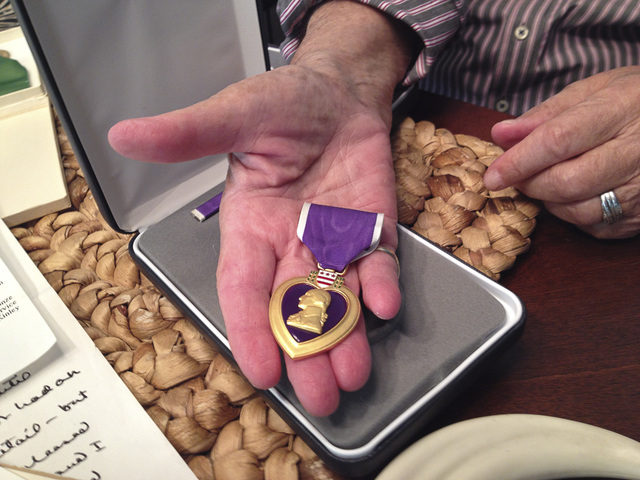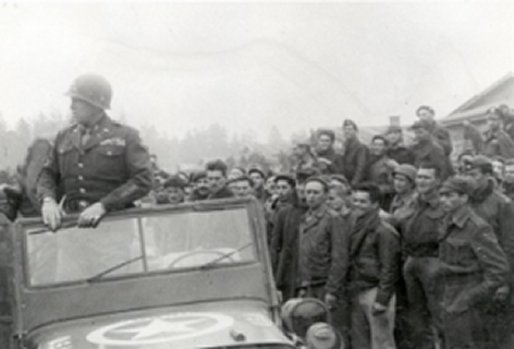WWII veteran recalls ‘men we left behind’
At age 96, Alan Dunbar admits that his World War II experience as a wounded American soldier in German prison camps made him “as sentimental as the next guy.”
That’s why on National POW/MIA Recognition Day today, he said he will be thinking about “the men we left behind. The men who were killed. The men who were wounded.”
“I’m giving it to you from the heart because I feel that somebody’s got to know that it’s tough to see a man die that you’ve been training,” he said Tuesday at his Las Vegas home.
“It hurt me when I lost somebody because he was wounded and he wasn’t taking care of himself,” he said. “You become kin to them.”
Having just graduated from Temple University, Dunbar was among the first draftees from Philadelphia immediately after the Dec. 7, 1941, Japanese attack on Pearl Harbor. Following a brief stint as an enlisted man, he quickly became an officer candidate who emerged from Fort Benning, Ga., as a second lieutenant.
Three years later — after losing his brother, Joseph, a Navy commander whose ship was sunk while chasing German submarines off the coast of Italy — Dunbar found himself in the Battle of the Bulge as captain of a communications platoon in the 106th “Golden Lion” Division.
It was the snowy winter of December 1944 and they had dug foxholes in the pine forest along the border of Belgium and Germany. Dunbar’s unit, which was part of the 422nd Infantry Regiment, was positioned near the German towns of Auw and Schlausenbach.
On the morning of Dec. 16, thousands of German artillery pieces started pounding the area.
“What would follow in the next few days would become known as the largest defeat of the U.S. Army in World War II,” according to the 106th Division’s website. “Over the next three days, the 422nd and 423rd Regiments became completely cut off from the rest of the division.”
Memories of what happened Dec. 19, 1944, still burn in Dunbar’s mind.
“I was with my wire crew. One of the guys was on top of a tree. He says to me, ‘Captain, I see a lot of Germans out there.’ The next thing you know they engulfed us,” he recalled.
“There was so damn many of them and so few of us. We fought them for a while,” he said, describing the “glancing blow” from a bullet that pierced his left leg.
Commanders of the 422nd and 423rd regiments decided it would be best to surrender than see their soldiers killed.
Dunbar and his platoon were among 7,000 soldiers from the 106th Division who “went into German captivity and would spend the duration of the war in a series of POW camps,” according to the division’s website.
He was among 185 officers who were herded into boxcars and hauled by train to Oflag 64 near Schubin, Poland.
That’s where he met “the man who saved my life,” Lt. Col. John K. Waters, the son-in-law of Gen. George S. Patton, who had been captured in Tunisia in 1943 and was in charge of the camp’s 1,500 officer POWs, mostly from the North Africa campaign.
With the war in Europe at a turning point, Russian forces were bearing down on Nazi-occupied Poland.
“When the Russians made their advance, the German commander decided they were going to evacuate the camp,” Dunbar said.
The Germans’ plan was to march the American prisoners back to Germany.
“It was in the dead of winter. My boots, I just about couldn’t get them on because my leg was swollen. My feet were swollen,” he said. “So the Germans told me that since I couldn’t walk they were going to leave me by the side of the road.”
But Waters confronted the German guards.
“He said, ‘This man is an American officer. He’s entitled to privileges. And one of the privileges is that since he is wounded he can ride in the meat wagon.’ These were for the people who were sick or shot,” Dunbar said.
“He told the German commander, ‘This unit is not going to leave this camp until you ...”
But before Waters could finish, “the German commander says, ‘He rides in the wagon.’ This man saved my life. I admired this man, and we became very good friends,” Dunbar said.
When the procession stopped at night, Waters would come to the meat wagon and “pick me up bodily and carry me into the barn where we were supposed to sleep. I said to him one time, ‘Colonel, you saved my life.’ And he says, ‘No I didn’t, Alan. I was just doing what was right.’ ”
On March 27, 1945, Patton had sent a task force 50 miles behind enemy lines to liberate the Hammelburg, Germany, prison camp where Waters and Dunbar were being held. Waters “went out to greet the task force and a German guard shot him in the back,” Dunbar said.
Waters was so badly wounded, the Germans released him to allied authorities, but they captured the task force “and they became POWs with us,” he said.
After about 10 days, the American prisoners were transferred to the infamous Stalag VII-A camp at Moosburg, Germany.
On April 29, 1945, a task force from the 14th Armored Division succeeded in liberating Moosburg.
“And Gen. Patton came in with his two silver revolvers. He says, ‘Gentlemen, I am here to liberate Moosburg and send you all back to where you came from,’ ” Dunbar recalled. “And some guy in the rear says, ‘The hell with that general. Where the hell are we going to get the planes to go home?’
“And they sent in over 100 C-47s to pick up the POWs. There were 1,500 POWs. And they flew us to France.”
After World War II, Dunbar stayed in touch with Waters, who recovered from his wounds and went on to become a four-star general. He died in 1989.
Dunbar retired as a lieutenant colonel and then worked as a claims adjudicator for Veterans Affairs in Philadelphia, Cleveland, San Diego, Washington, D.C., and Los Angeles.
He retired from the VA in 1980 and moved to Las Vegas.
Since World War II, he has received “lots of letters from the parents thanking me for bringing their sons back. But, it’s all in a days work,” he said.
Contact Keith Rogers at krogers@reviewjournal.com or 702-383-0308. Find him on Twitter: @KeithRogers2.



















